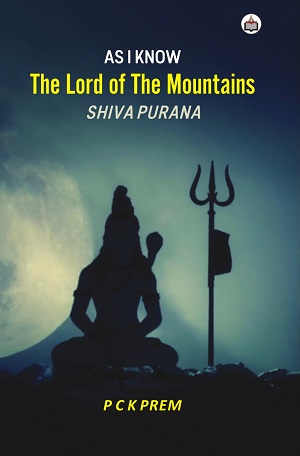Dec 29, 2025
Dec 29, 2025
by P C K Prem
As I Know: The Lord of the Mountains – Shiv Purana: 149
Now the great monk tells Krishna about the significance of special sanctification of a devotee or disciple
 A man, who wishes to understand the procedure, process, details of rituals and material required and related matters of worship and prayers, ought to go through the discourse completely as contained in second part of Vayaveeya Samhita. Monk Upamanyu gives detailed procedure of special consecration of a sadhaka – devotee and thereafter, tells how a sanctified devotee will adorn the title of a preceptor after he has performed pasupata rite provided he holds other virtues, candor and aptitude.
A man, who wishes to understand the procedure, process, details of rituals and material required and related matters of worship and prayers, ought to go through the discourse completely as contained in second part of Vayaveeya Samhita. Monk Upamanyu gives detailed procedure of special consecration of a sadhaka – devotee and thereafter, tells how a sanctified devotee will adorn the title of a preceptor after he has performed pasupata rite provided he holds other virtues, candor and aptitude.
Here, only a succinct mention is available for the inquisitive reader as to what this particular segment of the great Purana contains.
If a guru feels unfit to learn fully Shiva’s knowledge with purity of heart and intellect, he should not become a guru, the monk told. Initially, construction of mandala, installation of vessels in right directions etc before worship as told earlier is important he told. He makes clear that preparations with a requisite material for the worship are essential. It takes time but initial steps need proper adherence.
After the completion of initial process, the preceptor places his hand on the disciple’s head and repeats Shiva mantra with a pure heart, for he is Shivacharaya. He will complete the propitiation, pour one hundred and eight ahuties and shall complete it, and thereafter, he shall appear before the lord, prostrate before him and tell that the disciple is a preceptor now. He shall give necessary things to the new preceptor – acharya. There are four ways for the consecration of disciples, the monk tells that are necessary for a man to attain liberation from worldly bondages. The great monk speaks about the nature of karmas – the compulsory and the optional and kamyas.
After spelling out different paths for the consecration of devotees, he, the great monk Upamanyu tells Krishna about the compulsory and optional – Nitya, Naimitika religious and kamya rites.
He tells about proper preparation after selection of the right place, choosing the right time, material required, bodily discipline, things necessary for cleansing the body like tooth brush (twig), cow dung etc., discarding old clothes and wearing new one after bath.
A celibate, an ascetic and a widow should avoid use of scented soaps etc. and ought to keep tied up hair, wear thread and should take a few drops of water (achamana), before taking bath, think of Shiva and Shakti and chant holy mantra, and again should have achamana, pour water over the body, and so perform rituals. Baths are of different kinds and whatever is possible taking into consideration location etc, a devotee should adhere to the rituals on the direction of the preceptor if need be.
After fulfilling initial requirement, he ought to take care to perform tarpana rites with regard to gods, holy men especially, the bhutas, pitres etc. and offer oblations – arghya. Worshipping sun and making of mandala wherever it is must, a devotee should ensure its sanctity, for attaining happiness, the monk told. After the completion of all rituals as Shiva wants, a devotee should adhere to, Upamanyu told, he should bow before the lord and chant eight names of Shiva – Shiv, Maheshwara, Rudra, Vishnu, Brahma Pitamaha etc.
Upamanyu tries to enlighten a devotee on different approaches of prayer and worship so that the great lord is delighted and the devotee is free from the bondages of the world and spreads the sacred message of Shiva. Worship and prayers are mental, verbal and physical and need relevant material, site and its sanctity etc. He also gives description of compulsory and optional rites as per the dictates of scriptures. Thereafter, he exhaustively talks of rules, rituals and other subsidiary rites etc relating to worship of the great lord for the knowledge of Krishna, which are contained in Vayaveeya Samhita. A devotee will find in detail if he wishes to know how to pray before the lord and worship him. Rites of sacrifice a devotee should know so that he gets the desired reward of bhakti.
Continued to Next Page
06-Jul-2024
More by : P C K Prem